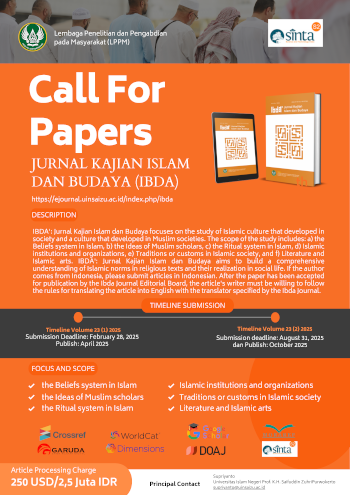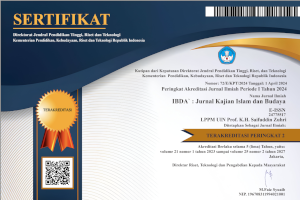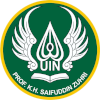The debate on philosophical sufism: Dynamics and dialectics in Aceh
DOI:
https://doi.org/10.24090/ibda.v21i1.7779Keywords:
Islamic thought, sufism , falsafi sufismAbstract
This research aims to explain the philosophy of tasawuf Hamzah Fansri in Nusantara Islam. The textual research method was employed to interpret the contents in the manuscripts of tasawuf falsafi in Aceh, especially regarding tasawuf falsafi, which Hamzah Fansūrī developed. The study findings confirm that Hamza Fansūrī's philosophical tasawuf thought is "symbolic-comtemplative" and attempts to locate the exploration of the symbols that are highlighted as the essence and substance of the teachings of philosophical tasawuf. There is a misunderstanding about philosophical Sufism, especially by other parties who try to observe and assess the substance of the teachings of philosophical Sufism, which is a natural thing. Criticism of Hamzah Fansurī's philosophical tasawuf thoughts, especially those made by Nūr al-Dīn al-Ranīrī, is commonplace and reasonable in the scientific realm of Islam. However, the accusation of slander and the opinion that Hamzah Fansurī has gone astray and deviated from Islamic principles is something common sense cannot accept. Hamzah Fansurī's thoughts related to Wujudiyah's views are widespread and have not only developed in Aceh. The originality of this study is that it confirms that philosophical Sufism has a symbolic and implicit aspect and characteristics that are difficult to understand. Therefore, if one is trapped in a narrow understanding of symbols, then philosophical Sufism is only a "skin" which is different from the substance or "content" inside.Downloads
References
Aizid, R. (2016a). Biografi ulama Nusantara (1st ed.). DIVA Press.
Aizid, R. (2016b). Sejarah Islam Nusantara (1st ed.). DIVA Press.
Arifin, M. (2015). Wujudiyah di Nusantara: Kontinuitas dan perubahan. Pustaka Pelajar.
Arifina, M., Agussanib, A., & Rudianto, R. (2020). Anthropological approaches in Islamic studies. Revista Argentina de Clínica Psicológica, 29(3), 653–661. https://doi.org/10.24205/03276716.2020.768
Arrasyid, A. (2020). Konsep-konsep tasawuf dan relevansinya dalam kehidupan. El-Afkar, 9(1), 50.
Badriyyah, L., & Az-Zaf, A. (2020). Perbedaan mazhab empat imam besar (Hanafi, Maliki, Syafi’i, dan Hambali) dalam paradigma Hukum Fikih. Al-Muaddib, 5(1), 65–79. https://doi.org/10.31604/muaddib.v5i1.65-79
Badrudin. (2015). Pengantar Ilmu Tasawuf (1st ed.). A-Empat.
Burhanudin, J. (2017). Islam dalam arus sejarah Indonesia (2nd ed.). Kencana.
Damanhuri, D. (2021). Hamzah Fanshuri tentang konsep wujud. Jurnal Pemikiran Islam, 1(1), 62–67.
Faridi, F., & Ariga, S. (2022). Kajian tasawuf dalam pendekatan agama Islam (Studi deskriptif tasawuf konvensional dan tasawuf modern serta implementasinya di sekolah). Jurnal Pendidikan Tambusai, 6(2), 16477–16483.
Hakiki, K. M. (2018). Tasawuf Wujūdiyyat: Tinjauan ulang polemik penyesatan Hamzah Fansūrī oleh Shaykh Nūr al-Dīn al-Ranīrī. Theologia, 29(1), 25–58. https://doi.org/10.21580/teo.2018.29.1.2400
Kurniati, D. (2021). Ulama-ulama sufi penyebar Islam dari Aceh abad 17 (Biografi, karya, dan ajaran). Tsaqofah & Tarikh: Jurnal Sejarah Dan Kebudayaan, 17(1), 17–30.
Manzilati, A. (2017). Metode penelitian kualitatif: Paradigma, metode, dan aplikasi. Universitas Brawijaya Press.
Muchsin, M. A., Hadi, A., Manan, A., & Putra, R. S. (2021). The disputes of Ratéb Siribèe in Aceh. Miqot: Jurnal Ilmu-Ilmu Keislaman, 45(1), 127–141. https://doi.org/10.30821/miqot.v45i1.798
Ni’am, S. (2017). Hamzah Fansūrī: Pelopor tasawuf Wujudiyah dan pengaruhnya hingga kini di Nusantara. Epistemé: Jurnal Pengembangan Ilmu Keislaman, 12(1), 261–286. https://doi.org/10.21274/epis.2017.12.1.261-286
Nur, A. F. (2020). Mencari karakteristik ekspresi bahasa metaforis dalam Tasawuf Wujudiyah Nusantara. Jurnal Al-Tsiqoh, 5(1), 25–27. https://doi.org/10.31538/altsiq.v5i1.608
Nuraini, N., & Marhayati, N. (2019). Peran tasawuf terhadap masyarakat modern. Analisis, 19(2), 297–320. https://doi.org/10.24042/ajsk.v19i2.3375
Nurdin, E. S. (2020). Pengantar Ilmu Tasawuf. Aslan Grafika Solution.
Peacock, J. L. (1978). Muslim puritans: Reformist psychology in Southeast Asian Islam. University of California Press.
Rasuki, R. (2019). Hamzah Fansūrī dan doktrin Wahdat al-Wujud di Nusantara. Jurnal Kariman, 6(2), 213–224. https://doi.org/10.52185/kariman.v6i2.89
Retsikas, K. (2012). Becoming sacred: Humanity and divinity in East Java, Indonesia. In Articulating Islam: Anthropological approaches to Muslim worlds (pp. 119–138). Springer Netherlands. https://doi.org/10.1007/978-94-007-4267-3_6
Riddel, P. G. (2020). The sufi path: Travelling in search of learning: An Indonesian case study. In R. J. Nicholls & P. G. Riddel (Eds.), Insights into Sufism: Voices from the hearth (pp. 151–168). Cambridge Scholar Publishing.
Sholihin, P. (2021). Pemikiran tasawuf perspektif syariat Islam. SEMJ: Sharia Economic Management BusinessJournal, 2(1), 14–23.
Siraj, F. M. (2021). Pengaruh Ibn Arabi dalam Kosmologi Hamzah Faansuri. Jurnal Peradaban, 1(1), 10–28.
Sudrajat, A. (2019). Pemikiran Wujudiyah Hamzah Fansūrī dan kritik Nurudin al-Raniri. Humanika, 17(1), 55–76. https://doi.org/10.21831/hum.v17i1.23123
Downloads
Published
How to Cite
Issue
Section
License
Copyright (c) 2023 Mukhlis Latif

This work is licensed under a Creative Commons Attribution-ShareAlike 4.0 International License.
Authors who publish with this journal agree to the following terms:
- Authors retain copyright and grant the journal right of first publication with the work simultaneously licensed under a Creative Commons Attribution-ShareAlike License a that allows others to share the work with an acknowledgement of the work's authorship and initial publication in this journal.
- Authors are able to enter into separate, additional contractual arrangements for the non-exclusive distribution of the journal's published version of the work (e.g., post it to an institutional repository or publish it in a book), with an acknowledgment of its initial publication in this journal.
- Authors are permitted and encouraged to post their work online (e.g., in institutional repositories or on their website) before and during the submission process, as it can lead to productive exchanges, as well as earlier and greater citation of published work (See The Effect of Open Access).
















